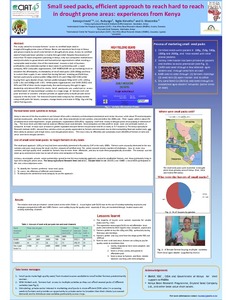Small seed packs, efficient approach to reach hard to reach in drought prone areas: experiences from Kenya
This study aimed to increase farmers’ access to certified bean seed in marginal/drought prone areas of Kenya. Beans are important food crop in Kenya and grown mainly by small scale farmers in drought prone areas. Access to certified seed of improved bean varieties is mainly through relief. Despite the presence of more than 70 seed companies operating in Kenya, only two companies market bean seed particularly to government and humanitarian organizations rather creating a sustainable seed market. One of the mentioned reasons is lack of business profitability and unreliable market in bean seed. In partnership with a seed company, NGO and public organizations, CIAT‐PABRA/KARI set up marketing trials to establish the affordability, marketability of small seed packs (100‐2000g) and how to sustain their supply. It was noted that during farmers’ meeting and field days, farmers particularly women prefer 100g (USD 0.13) and 250g (USD 0.66) while buying from agro‐dealers shops, farmers prefer between 500g (USD 1.05) ,1000 g (USD 1.91) and 2000g (USD 2.63) . While public organizations and CARD (NGO) sold 50% and 35% of their stocks respectively, the seed company through its agro-dealership sold almost 90% of its stocks. Small seed packs are useful tool to access certified seed ( of improved bean varieties to a large range of farmers (rich and poor and men or women) and also provide an opportunity to build private sector capacity in the dry land . For instance Dryland seed company has already started using small packs for beans, cowpeas, mungo beans and maize in 500g, 1kg and 2kg rather five kg packs.

